
The lottery is a type of gambling that allows people to win money by buying a ticket with a set of numbers on it. Typically, the state or city government runs the lottery.
Lotteries have been around for a long time, and their roots are traced to ancient times. In some countries, such as China and Egypt, they have long been a way of raising money for major projects. In other places, such as the United States and Europe, they have been used to raise money for local government.
Generally speaking, the lottery is a game of chance where a group of random numbers are drawn from a pool. The odds of winning a prize are relatively low. But it’s important to remember that every lottery is different, and the odds of winning a prize can vary depending on the lottery’s rules and how the numbers are picked.
In general, lottery players can increase their chances of winning by choosing a combination of numbers that aren’t close together. This is because other people are less likely to choose that same sequence of numbers.
Another option is to use a computer to pick the numbers for you, which many modern lottery games offer. Usually, there’s a box on the playslip that lets you indicate which number set you want the computer to choose. This method is often called “random betting” and can be a good choice for those who are in a hurry or don’t have a lot of time to spare.
A lottery can be an excellent way to fund public projects, such as building roads, libraries, colleges, or bridges. The lottery has also been a popular source of funding for charitable organizations, such as the National Society for the Blind or the American Cancer Society.
In the United States, there are over 37 state and territorial governments that operate lottery operations. The first state lottery was established in New Hampshire in 1964. It has since grown to include 10 additional states and the District of Columbia.
The lottery industry has experienced dramatic changes in recent years, with innovations such as instant games bringing in a huge boost in revenues. However, the lottery industry also has its share of controversy. There are arguments that the lottery industry is unregulated and unfair, and that it can be a form of gambling that leads to problems such as addiction.
Before playing the lottery, it’s a good idea to research its rules and regulations. These may be available from the lottery’s official website or from a retailer near you.
You should also know whether or not the lottery will require you to pay taxes on any winnings. If you’re not sure, talk to an accountant who specializes in tax planning.
It’s also a good idea to manage your bankroll well, and play the lottery responsibly. This means not spending more than you can afford to lose, and remembering that health and family come first.